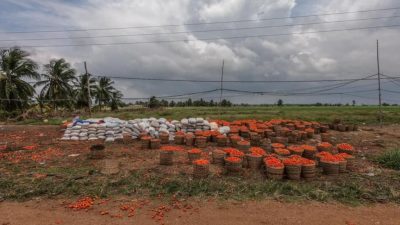Rotten tomatoes line roads in Benin after Nigeria closes border

Nigeria made the unilateral decision to shut its border with Benin in August and soon after also closed sections of its border with Cameroon and Niger, in an attempt to clamp down on the smuggling of contraband goods, including petrol and food. One key concern cited by authorities was the rice that Beninese traders import from Asia and then illegally re-export to Nigeria. According to the Nigerian authorities, the importation of these goods jeopardises the country’s agricultural policy aimed at achieving food autonomy.
But these protectionist measures taken by President Muhammadu Buhari have had disastrous consequences on Beninese farmers, many of whom sell their produce on the Nigerian market. They’ve suffered significant losses since the border closure.
‘It’s been hard since Nigeria shut its border’
We grow all different kinds of vegetables on our plots, including carrots, turnips and different kinds of greens.
Before the borders were closed, lots of Nigerians came to buy our produce. We sold them about 15 tons of vegetables a month, which represented about 75 percent of our total production. They were especially fond of our lettuces and our carrots.
But it has been really hard since Nigeria closed its borders. We are really struggling to sell our produce. Here in Cotonou there is much less demand. People aren’t buying, so we’ve suffered enormous losses.
We’d like our government to negotiate a re-opening of the border with the Nigerian government. That would be a good thing for us and business could start back up on both sides of the border.

‘We’ve reduced our production because we can’t sell as many vegetables’
The majority of our sales were to Nigerians so, since the border closed, we’ve reduced our production because we can’t sell as many vegetables. So we are sitting here, twiddling our thumbs. If the border stays closed, the future is gloomy.
‘I visited one farmer’s garden where the tomatoes were just rotting on the vines’
In the communities close to the border with Togo, many rotten tomatoes have been abandoned on the side of the road as there aren’t enough buyers. In Grand-Popo [Editor’s note: A coastal town in Benin located on the border with Togo], I visited one farmer’s garden where the tomatoes were just rotting on the vines because the Nigerian customers hadn’t come. He had taken out a loan for 3.5 million CFA francs [Editor’s note: equivalent to €5,400] to buy seeds and fertiliser for the season and now he can’t pay it back. It was a major loss for him.
In 2004, authorities in Benin signed a memorandum of agreement with Nigerian authorities that listed about 30 products that were banned from import into Nigeria. The list included food products as well as car accessories. But Benin doesn’t always respect this agreement. According to the World Bank, about 20 percent of Benin’s GDP comes from the informal exportation and re-exportation of products to Nigeria. (The Observers)

